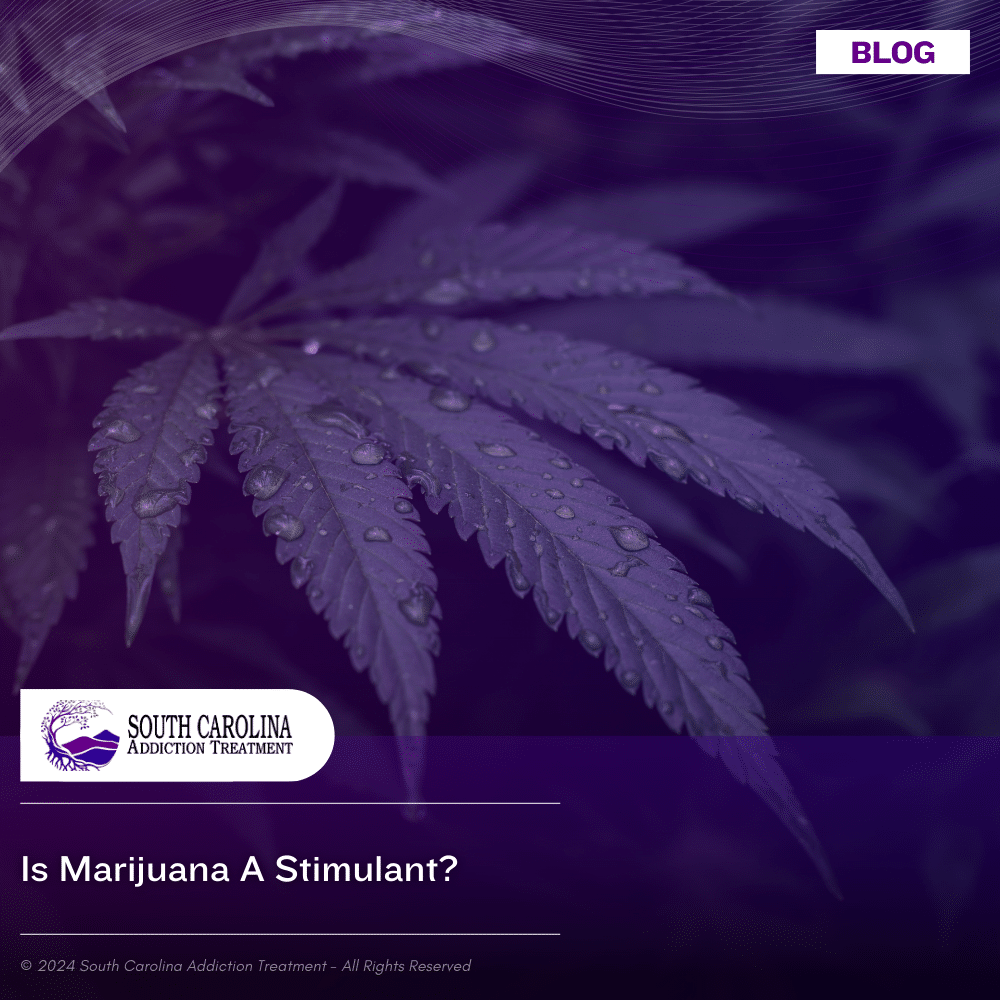Is Marijuana a Stimulant?

Medically Verified: 2/1/24
Medical Reviewer
Chief Editor

All of the information on this page has been reviewed and verified by a certified addiction professional.
Marijuana is the dried flower of the Cannabis sativa plant. This plant contains tetrahydrocannabinol (THC), a mood-and-mind-altering substance.[1] While some states have legalized the recreational and medical use of marijuana, it remains illegal on a federal level.
Common names used to describe marijuana include cannabis, weed, pot, grass, mary jane, and more.
Marijuana is one of the most widely abused substances in the United States. According to the National Institute of Drug Abuse (NIDA), “Among people aged 12 or older in 2021, 18.7% (or about 52.5 million people) reported using cannabis in the past 12 months.”[2]
While this substance is one of the most well-known and widely used illicit drugs in the United States, people have had difficulty classifying it as a specific type of substance. While alcohol is called a depressant and cocaine is referred to as a stimulant, cannabis does not have its own classification because it can cause varied effects depending on the person consuming it and the strain being used.
What Type of Drug is Marijuana?
The mind-altering substance that marijuana contains is known as THC. People often abuse weed because THC can cause effects like euphoria, relaxation, increased creativity, and feelings of overall pleasure. However, cannabis is known to cause a wide range of effects that vary from person to person.
Because of the myriad of side effects abusing weed can cause, marijuana is considered to be a stimulant, depressant, and hallucinogen all at the same time.
Stimulant Effects
Stimulant drugs increase the activity in your central nervous system. Common stimulants include ADHD medications like Adderall or illicit substances like cocaine and methamphetamine (meth). Stimulant drugs increase energy and wakefulness while causing a rush of euphoria.
Marijuana can cause stimulant effects, including:
- Elevated mood
- Fast heartbeat
- Anxiety and panic attacks
- Paranoia
- Psychosis
Marijuana has many different strains that people can use. These strains are usually broken up into three categories: sativas, indicas, and hybrids. Typically, people report experiencing stimulant-like effects when they smoke or consume sativa strains of cannabis.
Depressant Effects
People typically misuse marijuana in hopes of experiencing depressant effects. Depressant drugs decrease the activity in your central nervous system, leading to euphoria, drowsiness, and an overall feeling of calmness.
The common depressant effects of weed include:
- Relaxation
- Drowsiness or sleepiness
- Muscle relaxation or pain relief
- Memory loss
- Dizziness and lightheadedness
- Improvement of insomnia
- Anxiety relief
Many people claim that Indica strains of marijuana cause depressant effects. While people claim that sativa strains cause stimulant effects and indica strains cause depressant effects, no evidence supports these ideas.[3]
Hallucinogenic Effects
Marijuana is often stereotyped as a hallucinogenic drug but there is a difference between hallucinations and hallucinogenic effects. It is extremely rare for people to experience hallucinations when they consume cannabis, but marijuana can cause similar effects to hallucinogenic drugs, causing many people to falsely classify it as a hallucinogen.
The hallucinogenic effects of marijuana may include:
- Altered sense of time
- Sensory perception changes
- Nausea
- Dry mouth
- Motor skill issues
- Detachment from self or reality
One of the most common hallucinogenic effects of marijuana is changes in your perception. For example, weed can cause you to think sounds are louder or quieter than they actually are.
Can You Get Addicted to Marijuana?
While many people view cannabis as a non-habit-forming drug, it is possible to become addicted to it. People struggling with an addiction to marijuana may be mentally and physically dependent on the drug, have developed a tolerance, and could experience withdrawal symptoms and cravings when they abruptly stop consuming it.
According to the National Institute of Drug Abuse (NIDA), “Data suggest that 30% of those who use marijuana may have some degree of marijuana use disorder.”[4]
If you experience the following symptoms of marijuana withdrawal when you stop using the substance, you might be addicted:[5]
- Anxiety
- Irritability
- Anger or aggression
- Disturbed sleep
- Insomnia
- Depression
- Loss of appetite
- Chills
- Headaches
- Night sweats
- Stomach pain
If you struggle with a marijuana addiction, you should seek help from a drug rehab program. While many people think cannabis is a safe and harmless substance to use, it can have devastating effects on your life. For example, some individuals may have a hard time meeting their responsibilities due to their marijuana use.
Find Help for Marijuana Addiction
Oftentimes, people struggling with a cannabis use disorder avoid treatment because they believe it is not harmful enough to require treatment. When compared to drugs like heroin or meth, you might feel like marijuana addiction does not warrant significant concern. However, it is important to note that any type of substance use disorder requires professional treatment and support.
With that being said, if you are suffering from marijuana addiction, South Carolina Addiction Treatment Center is here to help. With a combination of evidence-based behavioral therapy, peer support, and relapse prevention planning, we can provide you with everything you need to maintain long-term recovery.
To learn more about our marijuana treatment program, contact South Carolina Addiction Treatment Center today.
References:
- https://www.cdc.gov/marijuana/what-we-know.html
- https://nida.nih.gov/publications/research-reports/marijuana/what-scope-marijuana-use-in-united-states
- https://www.dal.ca/news/2022/01/07/cannabis-labels-study-indica-sativa.html
- https://nida.nih.gov/publications/research-reports/marijuana/marijuana-addictive
- https://www.ncbi.nlm.nih.gov/pmc/articles/PMC9110555/

